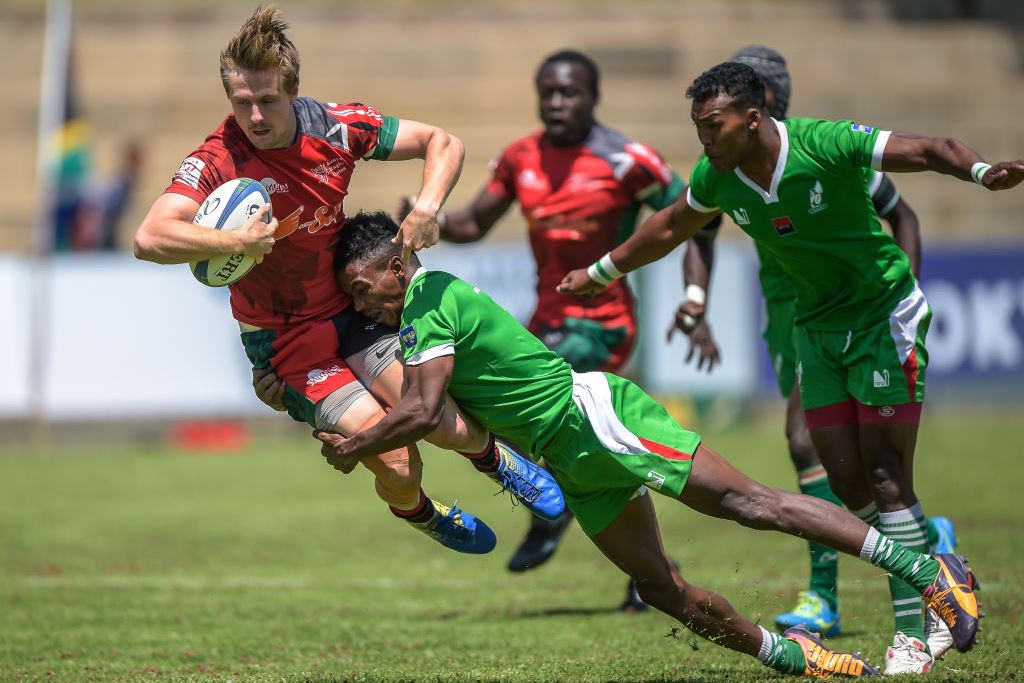
I wonder if the launch of a new Challenger Sevens Series for teams below World Series level might provide the window of opportunity for a little theory of mine to be tested, namely that Madagascar could become a major Sevens team if they switched their attention to the short form of the game.
Having sat in a wildly enthusiastic 30,000+ crowd at the Mahamasina Municipal Stadium in Antananarivo for the Makis World Cup qualifiers against Zimbabwe and Namibia five years ago, there can be no doubting their love of ruby and appetite for fierce competition.
The stark reality, however, is that nature is against them and they will never be big enough to flourish at the top level.
Anybody more than 6ft and 14st is a rarity in that part of the world and there comes a point, as they try and fight their way up the world rankings, when they just don’t have the poundage to be competitive.
Unlike wealthy Japan, for example, they don’t have the option of importing, and ‘qualifying’ through residency, big units from South Africa, New Zealand and Tonga to do the heavy lifting.
Yet they have great ball handling skills, real gas and the infinite courage always required by David when tackling Goliath. To these eyes the Maki are made for Sevens.
My suggestions along these lines however went down like a lead balloon during my visit, being interpreted as a slur on their manhood and virility. Battling impossible odds and taking a beating against much bigger teams – and winning accolades and kudos for that – has almost become their raison d’etre.
Their glory has always been in courageous defeat, there are never any recriminations or inquests when they lose heavily. Even in defeat they are national heroes, much more so than the nation’s footballers.
The Challenger series is, over the coming years, going to take Sevens around the world and I would suggest that if Madagascar took Sevens really seriously for a year or two and featured prominently in a home leg at their spectacularly situated stadium, their fanatical fans would rather enjoy seeing their side in contention for silverware and honours. Antananarivo would soon become an exotic but noted rugby venue that would literally put Madagascar on the rugby map.
It would also provide a pathway for their better players and even on my short trip there were two or three obvious candidates among their backs for professional contracts in Europe if any agents had been present to clock them.
Madagascar is an extremely poor country and that financial incentive and route to the top would be a great motivator for young players.
Happily there seems to have been something of a rethink by Madagascar recently. They hurriedly put together a squad last month to contest the Africa qualifying tournament for Tokyo 2020 during which they rather surprised themselves in Johannesburg by finishing fourth having lost to eventual winners and qualifiers Kenya in the semi-final. It was a very decent effort.
Somebody in Antananarivo has clearly done the maths. With Sevens experts South Africa almost certain to qualify automatically for all future Olympic tournaments, the Africa qualifying tournament is far from daunting. One upset win over Kenya – and upset wins always happen in Sevens at every level – and the Maki might find themselves in business and with a team at the Olympic finals.
This season’s inaugural Challenger series will comprise two tournaments – one in Chile and one in Uruguay – but the expectation is that it will steadily grow both in the number of tournaments and its Geographic scope.
The top eight sides over the two tournaments will then play-off in a knock-out competition at Hong Kong for promotion into the World Series next season.
Based on current world Sevens rankings there will be 13 core teams for this initial Challenger series – Brazil, Chile, Germany, Hong Kong, Italy, Jamaica, Japan, Papua New Guinea, Portugal, Tonga, Uganda, Uruguay and Zimbabwe. With the two inaugural tournaments in South America three local sides – Colombia, Mexico and Paraguay – will be given wild card entries. There are also plans to launch a parallel women’s Challenger Series although that won’t happen this season.
Nations other than Madagascar might also have to review their priorities. To run a competitive Sevens squad is quite a commitment of personel and finances and while for some who have no great fifteens pretensions – Jamaica, PNG, Uganda, Mexico, Colombia and, alas, these days Zimbabwe – it would make sense to commit whole heartedly while there are others like Brazil, Hong Kong, Japan, Tonga and Uruguay that might see it at as something of a distraction.
BRENDAN GALLAGHER / Title image: Handout / Getty Images


British and Irish Lions
Charlie Elliott: The 17 backs I would select for the British and Irish Lions

























You must be logged in to post a comment Login